|
|
|
|
| Higashinari-ku Top>Attractions |
| |
|
| |
Landmarks and Historic Sites |
|
| |
|
| Himekoso Shrine |
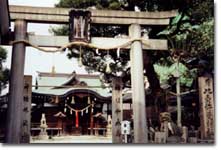 |
The shrine is dedicated to a big name
god (Engishiki Daimyoujin Taisha) and is listed in the engishiki
book of shrine names. Four gods are worshipped, including Shitateruhime
no Mikoto. The origin of the shrine is very old as Shitateruhime no
Mikoto was worshipped on Akume Mountain in 28BC. In 607, when the
figure of the god was moved to the main shrine, the Emperor honored
the ceremony with his presence. In 859, the rank of the shrine was
raised.
Due to the fires of the Battle of Ishiyama in 1570, the shrine moved
to its current location. It houses the guardian deity of the old Kohashi
Village, and owns many cultural assets. One can learn the history
of the culture of Naniwa (Osaka) from this shrine. |
| Location: 3-8-14 Higashiobase, Higashinari-ku |
|
|
| Yasaka Shrine |
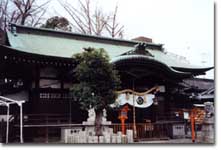 |
| This shrine houses the guardian deity
of old Nakamichi Village, dedicated to Susanoo no Mikoto. It originated
when Fujiwara no Michinaga established a second house in this place
and worshipped here. They say that local people rebuilt the main hall
of the shrine in 1166 and moved it to its current location in 1584.
The original name of the shrine was Gozutenno Hakusangongen, but it
was changed to Yasaka Shrine in 1872. |
| Location: 4-8-20 Nakamichi,
Higashinari-ku |
|
|
| Hachioji Shrine |
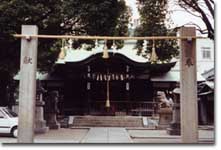 |
| Enshrining the guardian deity of old
Honjo Village, this shrine is dedicated to four gods, including Hachioji
Ookami. The shrine is said to have been created in the third year
of Emperor Ojin's reign (around 4th century), and Emperor Kotoku (early
7th century) presented it with a pair of stone guardian dogs. It was
known as Hachioji Inari Shrine, or "Tsubaki no gu" (the camellia
shrine). In 1872, its name was changed to Kudara Shrine. In 1909,
it incorporated Yatsurugi Shrine, which housed the guardian deity
of old Nishiimazato Village, and became Hachioji Shrine. |
| Location: 4-2-48 Nakamoto, Higashinari-ku |
|
|
| The Grand Shrine at Kumano |
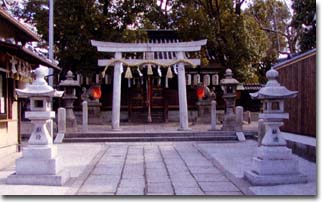 |
| Home of the guardian deities
of old Oimazato Village and dedicated to two gods, including Izanagi
no Mikoto, this shrine is said to have originated in 587. At the time
of the Battle of Ishiyama (1570), fires destroyed the shrine, but
it was rebuilt and since the Genna Era (early 17th century), the shrine
was customarily visited by castellans for Osaka Castle when they were
inaugurated and inspected their territory. It was formerly called
Kumanogongen, but in 1872, the current name was instituted.
In 1911, it incorporated Yatsurugi Shrine, with the guardian deity
of old Higashiimazato Village. |
| Location: 4-16-48 Oimazato,
Higashinari-ku |
|
|
| Fukae Inari Shrine |
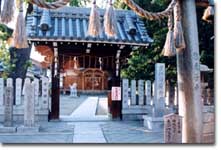 |
| This is the guardian shrine
of old Fukae Village, dedicated to three gods, including Uga no Mitama
no Kami. It is said to have been created in the early 8th century
and Toyotomi Hideyori is believed to have remodeled the shrine pavilions
in 1603. The shrine has strong ties with Kasanuibe (sedge hat craft
workers) and currently, the precincts are designated as the "Historic
Site of Kasanuimura" and the "Place Associated with Fukae Sedge Hat-making"
by Osaka Prefecture and Osaka City. |
| Location: 3-16-17 Fukaeminami,
Higashinari-ku |
|
|
|
| Higashinari-ku Top>Attractions |




